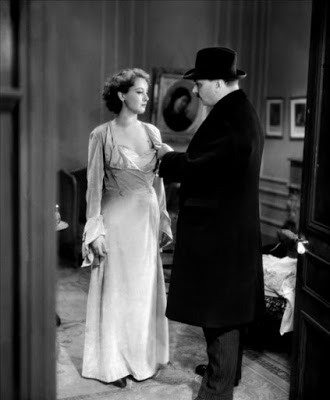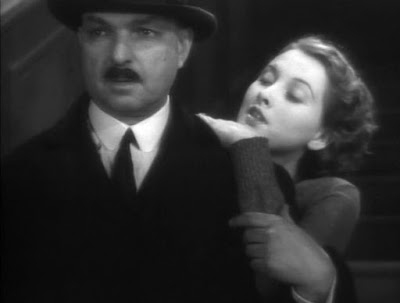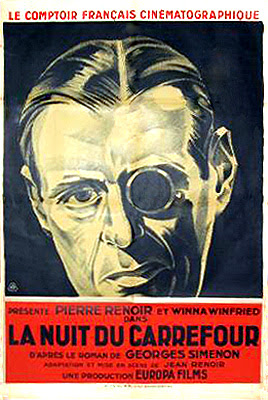Night at the Crossroads

Director: Jean Renoir
Year: 1932
Rating: 5.5
Country: France
Night at the Crossroads (La nuit du carrefour)
in 1932 is I believe the first adaptation of an Inspector Maigret novel from
Georges Simenon. The Yellow Dog was released later the same year and A Man's
Neck was released the following year. Simenon and Maigret were all the rage
with Simenon having published 10 of his novels in 1931. Maigret would of
course remain the quintessential French policeman for the next 90 years with
more films (including a recent TV film of this book starring Rowan Atkinson)
and a few TV series.
This film also has the distinction of being directed by Jean Renoir. This
was an early film for Renoir, but later in the same year he directed the
classic Bondu Saved from Drowning and over the next decade a few more films
considered among the greatest - The Grand Illusion, The Rules of the Game,
Le Bete Humaine and The Lower Depths. So it is interesting to see how he
handles a basic crime story. Godard of all people said ""Renoir's most mysterious
film "and "the only great French detective movie--in fact, the greatest of
all adventure movies". Well. Not really. Mysterious primarily because so
much of it takes place in the night that it gets very confusing. If I hadn't
seen the Atkinson version recently I think I might have been totally lost.
I expect the print may have partially been the culprit for this as so much
of it is murky.
Maigret (played by Renoir's brother Pierre Renoir who appeared in a few of
his brother's other films but had a fine career on his own) is called in
to a murder out in the countryside near a crossroad. A man has been found
shot to death in a car that has been parked in someone's garage. He is a
diamond merchant and his jewelry has been stolen. Though it looks like a
simple case it is far from it as Maigret has to unwind the past lives of
a couple, the man next door and a garage that seems to be up to more than
filling gas. Throw in a femme fatale (the ravishing Winna Winifried who unfortunately
was to go on and only appear in a few more films) with a baby voice but a
woman's wiles.
Other than just the darkness, the lingering fog and the dismal rain that
falls all the time, events move so quickly in a 75 minute film that needed
about 30 minutes more with so many characters flying through the sets that
I had no idea how Maigret solves all this. I read the book years ago and
recall it being much more sedate and patient in its resolution. I read though
unsure of the accuracy that a reel has been lost which would seem about right.





